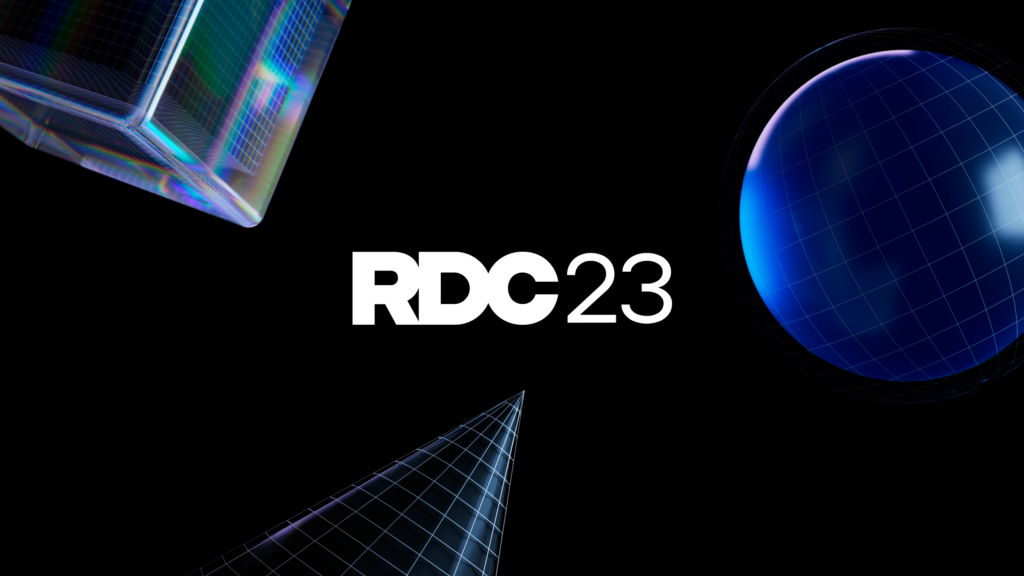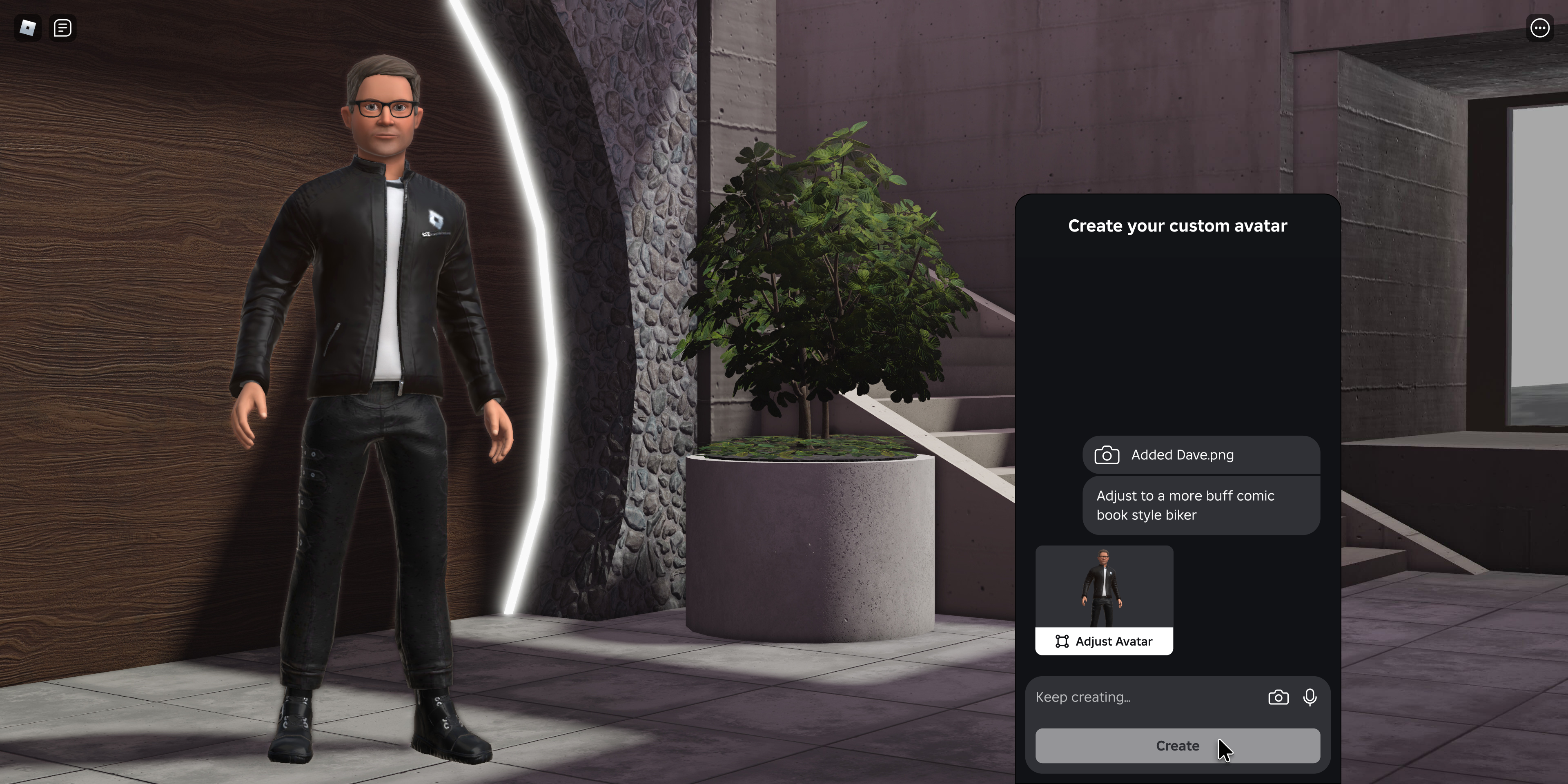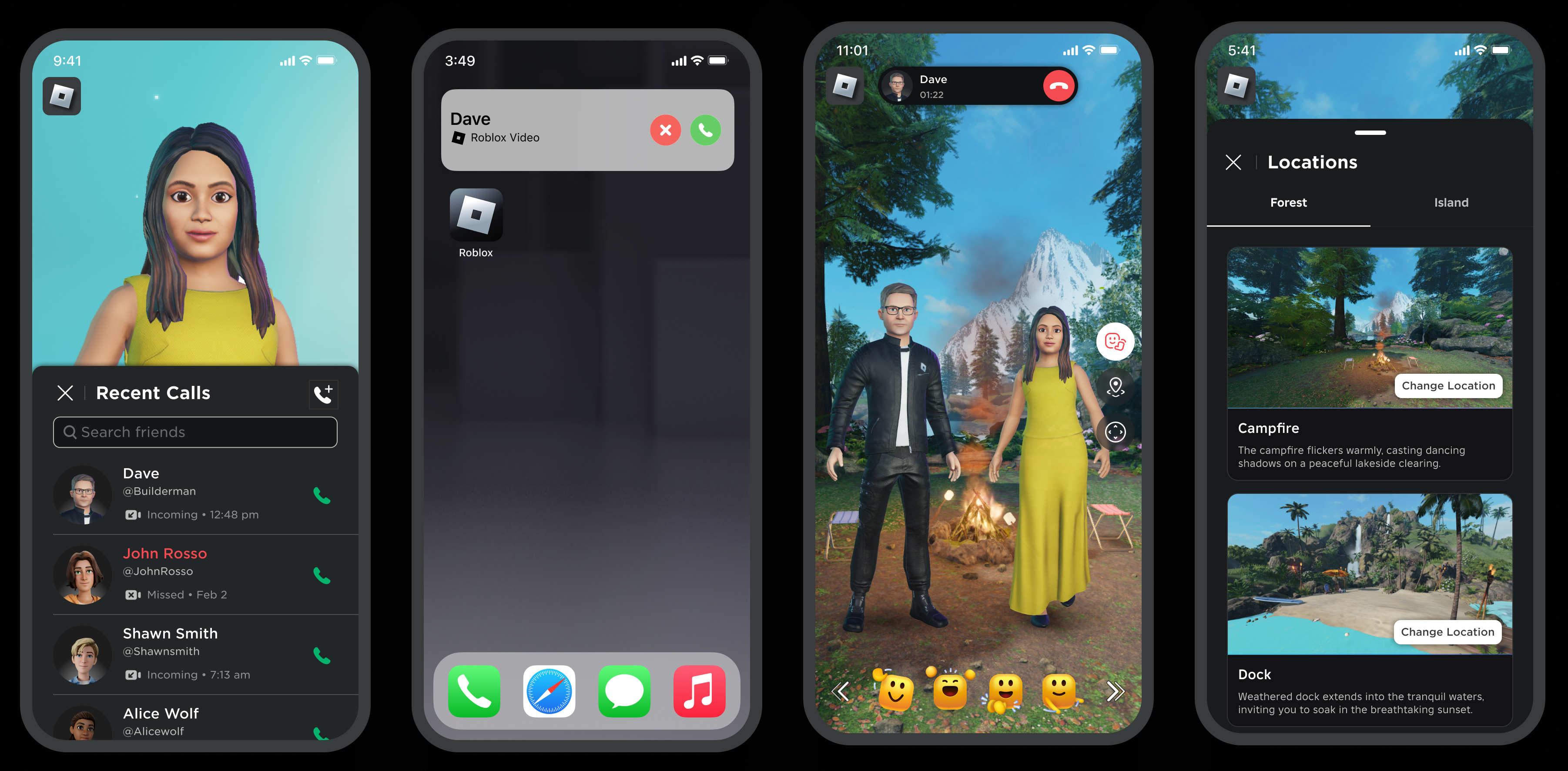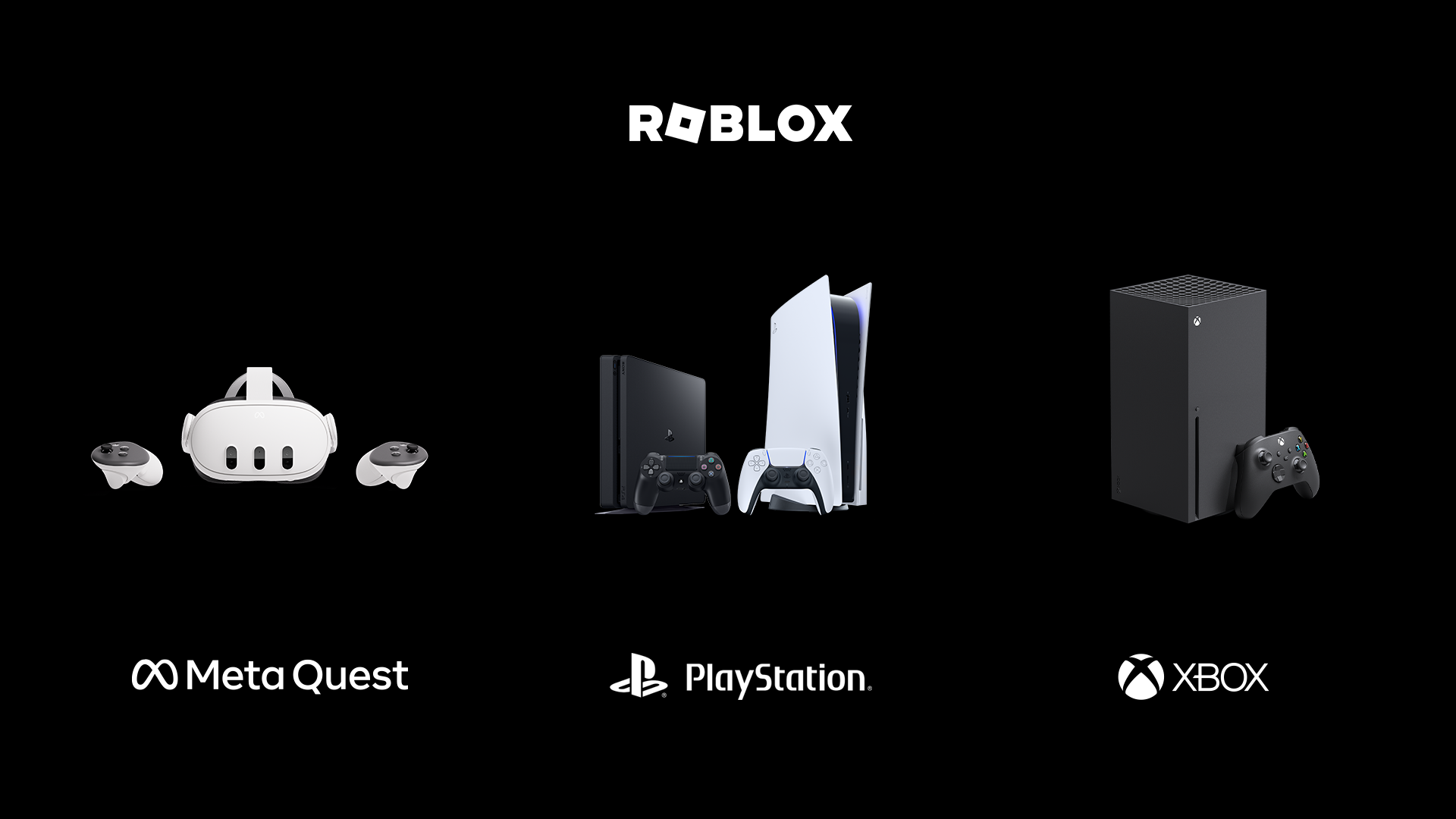RDC 2023: Where Roblox is going next

Our ninth annual Roblox Developers Conference (RDC) kicked off today at the Fort Mason Center in San Francisco. Every year, this event brings the most innovative creators from across our global community together to connect with one another and learn about our newest features and products. This year, we shared how we plan to achieve our vision of reimagining how people come together.
As of the quarter ending June 2023, 65.5 million users spend an average of 2.3 hours every day on Roblox. As the platform has grown, the community is more excited than ever about connecting, building, and communicating. The innovations we shared at RDC fall under the four principles we’ve established to help us realize our vision. We’ll talk through each of these principles below:
1: Evolving our Platform for 3D Immersive Communication and Connection
Roblox is a global immersive platform for connection and communication. We are making it easier to create personalized and expressive avatars as we evolve and introduce new ways to communicate on Roblox. These unique avatars help people fully connect with others in our immersive 3D experiences. Avatars represent a user’s identity, so an avatar’s look can change as often as the user likes—more than 10 million of our daily active users updated their avatars every day in 2022.
At RDC we unveiled new tools we’ll be rolling out throughout the year to make it as seamless as possible to create and publish avatars from anywhere:
New mesh and texture APIs will give creators control over changing items inside an experience, so they can morph the shape and dimensions, or change textures. Within the next few months, developers will have the option to enable these APIs to allow people to customize avatars—without leaving the experience. This will start with the customization of avatars themselves—adding freckles or changing the shape of the jaw—then expand into in-experience creation of avatar items, clothing, and emotes.
Our avatar creation tool now supports importing standard gLTF files in addition to OBJ and FBX files. We’ve also released a preview function that enables creators to see how their avatar will work with different facial expressions, emotes, accessories, and layered clothing. And coming later this year, we’ll release ML-powered tools that will automate the process of rigging, skinning, caging, and segmenting the model for the creator.
We plan to enable a way to easily create an avatar from an image and a text prompt, then customize it and add it to the user inventory to start using it. Today, avatar creation takes an experienced creator days, or up to a week. But in his keynote, Dave showed how easy it will be to create an avatar in just minutes with these new tools.

We’ll also continue expanding on the ability to express emotion through avatars, going beyond facial expressions to hand gestures and upper body movements, and new machine learning (ML) techniques that enable more realistic avatar movement. In the near future, a person’s avatar will mirror their exact facial expressions, right down to the same blink rate. All of this is important to enable people to have emotional connections in these immersive experiences in the same way we do outside of them. We’re so excited to see what our creators build with these new capabilities.
Sharing New Ways to Communicate
People already use Roblox to connect and communicate with friends via text chat and, for those over the age of 13 in the U.S., via chat with voice. Last month, we also shared the ability for those over age 13 to animate their avatar with facial animation, using the camera on their device. At RDC, we announced Roblox Connect, a new way for friends to call each other as their avatars—together in a shared experience.

Launching later this year, Connect will enable people to call a friend from their Roblox friends list using their real name and facial expressions—conveying nuance with their own body language—and be transported to a shared immersive space on Roblox for their conversation, sitting together by a campfire or standing beside a waterfall. Behind the scenes, we’re essentially packaging a Hollywood-style motion capture studio into something that runs on a mobile phone or laptop—without the need for equipment or motion-tracking dots. The device’s camera is all that’s needed to capture motion and translate it in real time.
We will open source Roblox Connect and have built it only using public platform APIs. By providing Roblox Connect directly to our millions of creators, we unleash their collective genius to develop new communications experiences. While we cannot possibly imagine all the ways our creators will use this technology, here are two examples of the potential power of this new functionality:
Today, someone who lives in San Francisco could meet up with a friend who lives in London at New York’s Metropolitan Museum of Art to check out the latest exhibit via The Met experience on Roblox. But with Connect, these friends could make a call on Roblox and teleport there together, hear their friend’s commentary about the art, and see their friend’s reactions, all in real time.
A father and his grown son, who’s moved across the country, could be together on a dock by a lake and reminisce about their last fishing trip. The son could see the expression on his dad’s avatar and hear his real laugh as they joke with each other.
2: Coming Together in Exceptional Experiences From Anywhere Across More Devices
Roblox is one of the largest immersive platforms available anywhere. As devices evolve and new versions become available, we want to provide everyone on Roblox with the best experience possible for their device. Creators can publish experiences once and immediately get them into the hands of a global audience across all of the platforms we support.

We’ve opened up access for developers to start creating experiences for Roblox on Meta Quest and have seen a tremendous response. In the first five days, we saw more than 1 million downloads of the open beta. At RDC, we shared that Roblox will be widely available to people on Meta Quest later this month. We also announced that we will be upgrading the Roblox Xbox app, enabling a new look, frequent updates (with access to the latest features), improved content recommendations, and an improved user experience.
And, at long last, we announced that next month, millions of Playstation console owners will be able to access the full catalog of Roblox experiences. Getting our developers’ experiences onto these two amazing platforms is a significant step toward making Roblox available on all of the most popular devices. And we’re not stopping there!
3: Growing a Vibrant Virtual Economy With More Ways to Earn
In addition to the suite of tools and services we already offer to support our creators, we’re sharing new ways for creators to earn on Roblox. As we shared in our vision for the Roblox economy, we support one of the world’s largest virtual economies. In the 12 months ended June 2023, Roblox developers have earned $680 million. In the span of a couple of years, we have also diversified and introduced new ways to allow more creators to earn.
Leveraging Generative AI
At RDC, we announced Assistant, a conversational AI that makes creation on Roblox more accessible and empowers advanced creators to build richer, more engaging experiences faster. Assistant will be available in Roblox Studio and Creator Hub later this year, and within experiences sometime next year to help creators learn, code, and build more effectively. Working with Assistant will be collaborative and iterative, so creators can provide feedback and Assistant will work to provide the best solution. This new generation of AI-powered tools will amplify the ability of all creators to bring their ideas to life.
Assistant builds on the existing use of generative AI on Roblox, which simultaneously lowers the barrier to entry for new or less experienced creators, and enables more established creators to automate tedious, repetitive tasks and quickly scale their work. In both cases, this unlocks new creative opportunities so we all benefit from a more diverse set of ideas, and bigger, more ambitious projects being shared on the platform. Earlier this year, we released Code Assist and Material Generator into beta and we’ve already seen great success with both tools. Since releasing Code Assist, we’ve seen the amount of code generated double compared to our previous autocomplete solution. Creators using the beta for Material Generator, which enables them to generate material variants with text prompts, increased their use of physics-based rendering (PBR) material variations by more than 50 percent compared to creators not using the beta.
Economic Opportunities for Creators
At RDC, we shared with creators key enhancements that will improve their ability to earn on Roblox. First, we shared that we’ll soon launch a way for creators to offer subscriptions within their experiences and the freedom to choose which features or offerings they make available as a subscription model. For instance, a creator could offer a subscription for a digital “trunk club” where subscribers regularly receive curated outfits, or a members-only fan club.
As a step toward making it possible for anyone on Roblox to participate in our economy, later this month, we are inviting anyone that is ID-verified and has Premium to create 3D items for our Marketplace. We care about creating a Marketplace with content people love and where creativity is protected. That’s why, as we open up our Marketplace this year, we are implementing safeguards in addition to ID verification that bring more accountability to creators. We are also developing easier ways for creators to detect duplicates of their items and more easily report, manage, and track IP claims. These tools are in development now and we’ll share details as they become available.
We are also evolving our Marketplace so that by next year, there will be two predominant types of items: those that are fixed in quantity (Limiteds) and those that have a flexible quantity, both with costs per unit to publish. Grounded in real-world economics, these systems are intended to help creators sustainably earn income. We launched Limiteds in April and through June 2023, we’ve seen strong traction, with 77 percent of Limiteds selling out and 80 percent of items reselling for more than the original price.
At last year’s RDC, we announced our plan to launch Immersive Ads, which we did this year. And while this was a year of learning, we are already seeing early signs of creators—especially our mid- to long-tail creators—earning up to 20 percent from Immersive Ads. Brands are also seeing the impact of these ads as a way to reach their communities more effectively. For example, H&M’s portal ads drove an 11 percent increase in the number of people joining its experience, with 97 percent of those people joining the experience for the first time. More than 11,000 people organically joined a friend who had teleported into the H&M experience through an Immersive Ad.
And we have heard loud and clear the feedback from our community about Creator Marketplace fees. Next year, we plan to update our Creator Marketplace fees to enable asset and tool creators to keep 100 percent of the proceeds from the sale of their items in Studio or Creator Hub—excluding tax and payment processing fees. Also coming next year is the ability for developers to sell models in addition to plugins, and a change to buy and sell assets in U.S. dollars instead of Robux, thus eliminating any Roblox platform fees. We’re starting small, but our hope is to build a vibrant economy of creator-to-creator exchanges. We want to help creators of all sizes diversify the ways they can earn, and pass on cost efficiencies in the form of savings or higher payouts where we can.
4: Working Together to Foster Civility, Built on a Foundation of Safety
Safety has always been in our DNA. It is the foundation upon which civility is built. We invest in technology and workflows to maintain a safe, civil, and welcoming platform for everyone in order to empower people to build communities that are fair, respectful, and helpful. As we introduce new communication mediums and invite more people to create, scaling our moderation tools is critical.
At RDC, we shared new tools that will help maintain a safe environment as we roll out new features. We’ve built an ML architecture that detects policy-violating voice communication. This model is the first of its kind deployed at scale, where the AI is directly evaluating voice content and expression, rather than first translating voice to text and then classifying that text. The English-language moderation model will be released shortly, with four additional languages to follow.
Fostering civility is a joint effort between Roblox and our creator community. We empower creators of experiences by providing the policies, tools, and insights to define what civility means for their community. By empowering creators, we enable them to incorporate context, such as what’s appropriate for their audience. Today, developers can use the IsVerified API to better manage access to features within their experiences based on a person’s account verification level. This can be used to grant access to specific parts of the experience or help them better manage in-experience moderation. Later this year, developer-configured text filters will provide developers with tools to decide what type of text is appropriate for their community and experience. This work is just part of our ongoing investment in the technology and workflows that create safe, civil, and thriving communities for everyone.
But this is not the end…
All of the innovations we shared at RDC will enable people to connect and communicate in a more immersive way than ever before, on an ever expanding range of devices. For creators, these tools will enable easy, intuitive creation from anywhere—and help creators build a business—built on a foundation of safety and civility. These are the principles that will help us achieve our vision: Reimagining how people come together. We are grateful and excited to continue this journey with our creator community and cannot wait to see the amazing things they’ll build with this new technology.
The post RDC 2023: Where Roblox is going next appeared first on Roblox Blog.




